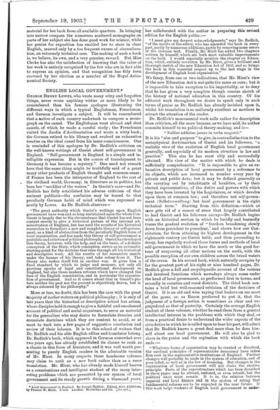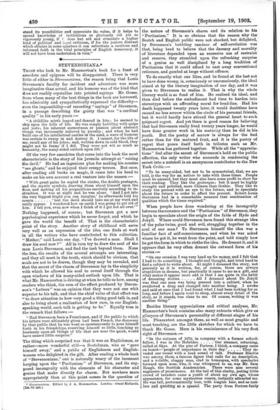ENGLISH LOCAL GOVERNMENT.*
• laical Government in England. By Joseph Redlich. Edited, with Additions, by Francis W. Hirst. 2 vols. London: Macmillan and Co. [2rs.•net.] GEORGE HENRY LEWES, who wrote many witty and forgotten things, never wrote anything wittier or more likely to be remembered than his famous apologue illustrating the different ways in which a typical Englishman, Frenchman, and German investigate a subject. It will be remembered that a native of each country undertook to compose a mono- graph on the camel. The Englishman went abroad and shot camels, of which he made a careful study ; the Frenchman visited the Jardin d'Acclimatation and wrote a witty book; the German retired to his library and evolved an exhaustive treatise on the ideal camel from his inner consciousness. One is reminded of this apologue by Dr. Redlich's criticism on the well-known writings of Gneist about self-government in England. "Self-government in England is a simple and in- telligible expression. But in the course of transhipment to Germany it has become a mystery." One need not remark here that the same thing might be truthfully said of a great many other products of English thought and common-sense ; if France has been the interpreter of England to the rest of . the civilised world, Germany, in literature as in politics, has been her " muddier of the waters." In Gneist's case—and Dr. Redlich has fully established his adverse criticism of that eminent publicist—the confusion may be traced to that peculiarly German habit of mind which was expressed so neatly by L.swes. As Dr. Redlich observes—
"The great authority which Gneist's writings upon English government have won and so long maintained upon the whole Con- tinent is largely due to the circumstance that Gneist has not been content merely to give a historical picture of the internal ad- ministration of England, but has used the results of his historical researches to formulate a new and complete theory of self-govern- ment, as a kind of abstraction from the peculiarly English form of local organisation, and has made this theory of self-government a postulate and criterion of political philosophy. Gneist has developed this theory, however, with the help, and on the basis, of a definite conception of the State, which conception serves as an axiomatic starting-point for the doctrine that runs through all his historical and descriptive work. All the results of his researches march under the banner of his theory, and take colour from it. The theory also makes itself felt in another way. It gives him a fixed standard by which to judge and measure, not only all previous epochs of legal and constitutional development in England, but also those modern reforms which have changed the face of the English constitution, and in particular the organisa- tion of government. And so it comes about that in Gneist's pic- ture neither the past nor the present is objectively drawn, but is always coloured by his philosophy."
More or less, no doubt, this has been the case with the great majority of earlier writers on political philosophy ; it is only of late years that the historical or descriptive school has arisen, whose disciples hold it enough to give a faithful and uncoloured account of political and social organisms, to serve as material for the generaliser who may desire to formulate theories and enunciate doctrines which they are content to avoid, or at most to tuck into a few pages of suggestive conclusion and review of their labours. It is to this school of writers that Dr. Redlich and his able English editor and translator belong. Dr. Redlich's book, which appeared in German somewhat over two years ago, has already established its claims to rank as a classic in this form of literature, and it was well worth pre- senting to purely English readers in the admirable version of Mr. Hirst. In many respects these handsome volumes may claim to rank as a new book rather than as a. mere translation. Mr. Hint, who has already made himself known as a conscientious and intelligent student of the many inter- esting problems Ishich are presented by our system of local government and its steady growth during a thousand years, has collaborated with the author in preparing this revised edition for the English public r-
" I must give my deepest acknowledgments," says Dr. Redlich, "of the merits of the editor, who has amended the book in every part, partly by numerous additions, partly by removing some errors of the German text. Finally, Mr. Hirst has added two chapters written by himself, which are both most valuable improvements on the book. I would especially mention the chapter on Educa- tion, which, entirely rewritten by Mr. Hirst, gives a brilliant and thorough sketch of the new Education Act of 1902, and so brings the book in this essential respect up to the last stage in the development of English local organisation."
We fancy, from one or two indications, that Mr. Hirst's view of the new Education Act is not quite the same as ours ; but it is impossible to take exception to his impartiality, or to deny that he has given a very complete though concise sketch of the history of national education in this country. Of his editorial work throughout we desire to speak only in such terms of praise as Dr. Redlich has already lavished upon it, whilst his translation is so uniformly excellent as nowhere to attract the attention of the reader.
Dr. Redlich's monumental work calls rather for description than criticism, all the more because, as we have said, its author commits himself to no political theory-making, and is-
" Nulliu.s addictus jurare in verbs magistri."
It is.his "aim and purpose " to give, in contradistinction to the metaphysical doctrinairism of Gneist and his followers, " a realistic view of the evolution of English local government generally, and especially of its modern structure in law and practice." This aim he has most ably and successfully attained. His view of the matter with which he deals is sufficiently comprehensive. " It is impossible to give an ex- haustive description of local government by a reference to its objects, which are increased in number every year by private and public Acts; but it may be defined generally as the carrying out by inhabitants of localities, or by their elected representatives, of the duties and powers with which they have been invested by the Legislature, or which devolve upon them at common law; and therefore not self-govern- ment (Selbstverwallung) but local government is the right technical term." Starting from this definition—which at once gets rid of a source of error that largely contributed to lead Gneist and his followers astray—Dr. Redlich begins with an historical section in which be lucidly and learnedly traces the gradual evolution of " freedom broadening slowly down from precedent to precedent," and shows how our Con- stitution, far from attaining its highest development in the eighteenth century (as Gneist held), and then proceeding to decay, has regularly evolved those forms and methods of local self-government in which we have the merit or the good for- tune of surpassing all other nations on the earth, with the possible exception of our own children across the broad waters of the ocean. In his second book, which naturally occupies by far the greatest part of his eight or nine hundred pages, Dr. Redlich gives a full and encyclopaedic account of the various and involved functions which nowadays always come under the head of local government, as performed first in towns, and secondly in counties and rural districts. The third book con- tains a brief but well-reasoned criticism of the doctrines of Gneist. It is an old and wise saying that lookers-on see most of the game, or, as Bacon preferred to put it, that the judgment of a foreign nation is sometimes as clear and un- prejudiced as that of posterity. Certainly the average English student of these volumes, whether he read them from a general intellectual interest in the problems with which they deal, or from a practical desire to understand the wider aspects of the civic duties in which he is called upon to bear his part, will admit that Dr. Redlich knows a great deal more than he does him- self about our local government. He will also be glad to share in the praise and the aspiration with which the book ends :— " Whatever forms of organisation may be created or dissolved, the cardinal principles of representative democracy have takes firm root in the representative institutions of England. Further changes will probably be made in the system of education, and of poor relief, as well as in the law of licensing. But changes in the organisation of local government will not shake the elective principle. Parts of the superstructure which has been described in these pages may be altered, restored, or even rebuilt, but the political basis must remain. It is in the relation between imperial and local finance and in the system of rating that fundamental reforms are to be expected in the near future. If this work helps students of English local government to under-
stand its possibilities and appreciate its value, if it helps to spread knowledge of institutions so gloriously old yet so vigorously young, if i' does but aid and stimulate a higher kind of political and legal criticism, if for the jealous distrust which obtains in some quarters it can substitute a cautious and informed faith in the vital principles of English democracy, it will not have been undertaken in vain."







































 Previous page
Previous page